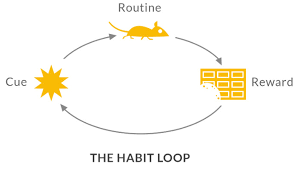The Science of Habits
Habits shape our lives in profound ways, influencing our behavior, productivity, and overall well-being. Understanding the science behind habits can help us harness their power to create positive changes and achieve our goals. This article delves into the neurological and psychological principles that govern habit formation and how to leverage this knowledge for personal growth.

The Habit Loop
At the core of every habit is a loop consisting of three components: cue, routine, and reward. This concept, popularized by Charles Duhigg in his book “The Power of Habit,” is fundamental to understanding how habits work.
1. Cue
A cue is a trigger that initiates the habit. It can be a specific time of day, an emotional state, a particular location, or an action by someone else. For example, feeling stressed (cue) might trigger the habit of eating comfort food.
2. Routine
The routine is the behavior or action itself. This is the habit that you perform in response to the cue. Continuing with the previous example, the routine would be eating the comfort food.
3. Reward
The reward is the benefit you gain from performing the habit. It reinforces the habit loop, making it more likely that you will repeat the behavior in the future. The reward for eating comfort food might be a temporary relief from stress.
The Role of the Brain in Habit Formation
Habits are formed in a part of the brain called the basal ganglia, which is responsible for processing routines and actions. When a behavior is repeated consistently, the brain starts to automate it, freeing up mental energy for other tasks. This is why habits feel effortless once they are established.
The prefrontal cortex, responsible for decision-making and self-control, is heavily involved in the formation of new habits. However, as a habit becomes ingrained, the reliance on the prefrontal cortex decreases, and the basal ganglia take over. This shift is why breaking old habits and forming new ones can be challenging.
The Psychology of Habit Formation
The process of habit formation is also influenced by psychological factors. Key principles include:
1. Repetition Consistent repetition of a behavior in response to a cue is crucial for habit formation. Research suggests that it takes, on average, 66 days to form a new habit, although this can vary depending on the complexity of the behavior.
2. Rewards and Reinforcement: Positive reinforcement strengthens the habit loop. Rewards can be intrinsic (internal satisfaction) or extrinsic (external rewards like treats or praise). The anticipation of the reward creates a craving, which drives the behavior.
3. Context and Environment The environment plays a significant role in habit formation. Creating a supportive environment that minimizes distractions and promotes the desired behavior can facilitate the development of new habits.
Strategies for Building New Habits
1. Identify Cues and Triggers: Start by identifying the cues that trigger your existing habits. Understanding these triggers allows you to modify or replace them with new ones. For instance, if you want to start exercising in the morning, use your alarm clock as a cue to get out of bed and start your workout routine.
2. Make Small Changes: Focus on small, manageable changes rather than drastic transformations. This makes the habit easier to adopt and maintain. For example, if you want to eat healthier, start by adding one serving of vegetables to your meals each day.
3. Use Positive Reinforcement: Reward yourself for sticking to your new habits. The reward doesn’t have to be extravagant; it could be something simple like enjoying a favorite snack or taking a few minutes to relax.
4. Design a Supportive Environment: Modify your environment to support your new habits. If you want to read more, place books in easily accessible locations. If you want to reduce screen time, keep your phone out of reach during certain hours.
5. Track Your Progress: Monitoring your progress can boost motivation and accountability. Use a habit tracker or journal to record your efforts and celebrate small victories along the way.
Overcoming Obstacles in Habit Formation
Despite best intentions, obstacles can arise in the habit formation process. Common challenges include:
1. Lack of Motivation: Motivation can fluctuate, making it difficult to maintain new habits. Relying on discipline and establishing a routine can help overcome periods of low motivation.
2. Old Habits Die Hard: Replacing deeply ingrained habits requires patience and persistence. Focus on creating new, positive habits that gradually overshadow the old ones.
3. Environmental Barriers: External factors, such as a busy schedule or unsupportive surroundings, can hinder habit formation. Plan ahead to mitigate these barriers, such as scheduling specific times for new habits or enlisting support from friends and family.
Conclusion
Understanding the science of habits provides valuable insights into how behaviors are formed and sustained. By leveraging the principles of the habit loop, the role of the brain, and psychological factors, we can create effective strategies for building new habits and breaking old ones. Embrace the power of small changes, use positive reinforcement, and design a supportive environment to achieve lasting personal growth and success.